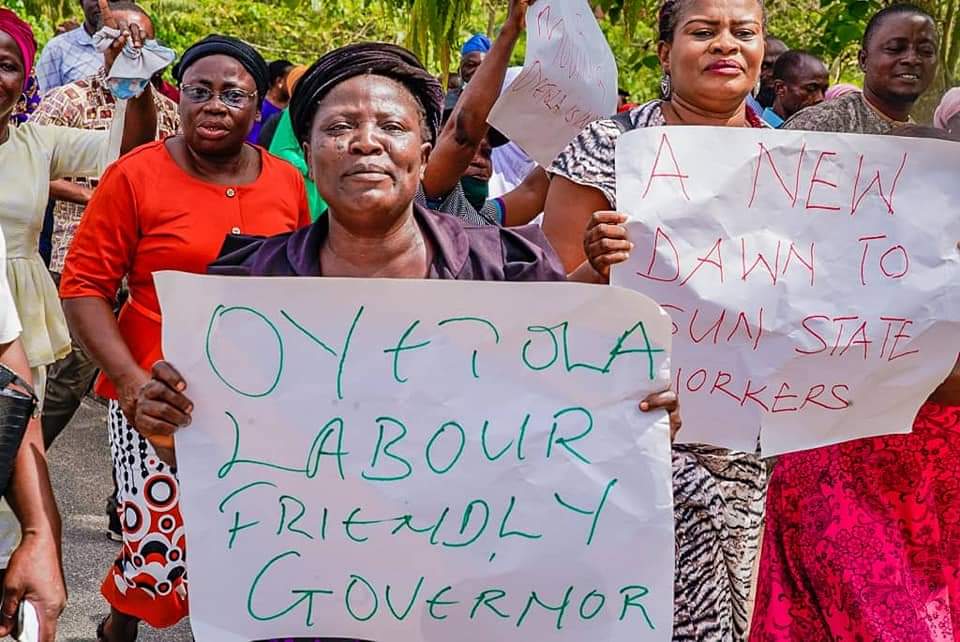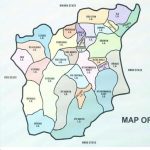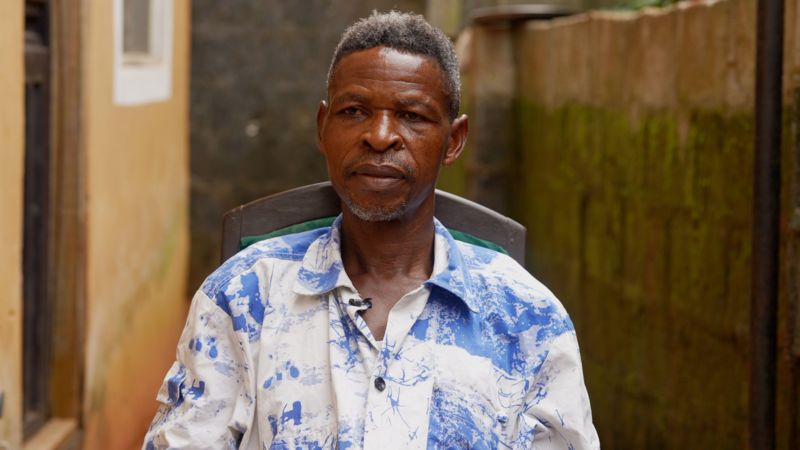By Yaya Ademola
On Friday, 30th October 2020, Governor Isiaka Gboyega Oyetola announced the approval and immediate implementation of the new minimum wage for all categories of workers in Osun.
He also lifted embargo on promotions and conversions, among other policy steps. These actions are highly commendable and symptomatic of APC disposition to Workers Welfare at all times and a fulfilment of one of Mr. Governor’s promises during his election campaign, despite today’s challenges in Nigeria. It is hoped that workers would reciprocate this good gesture by redoubling their efforts and commitment to work and increasing the State IGR.
As the workers were celebrating this however, the ever mischievous and never disappointing usual suspects had gone to town to spread outright lies and half-truth about All Progressive Party (APC) administration in the State as if it was not labour friendly until Governor Oyetola pronouncement especially under the leadership of the immediate past Governor, Ogbeni Rauf Adesoji Aregbesola.
These are their usual antics and stock-in-trade calculated at driving a divisive wedge into the APC Family, which has always failed. It is nevertheless necessary to remind ourselves of events and some facts on workers welfare since APC government assumed power in the State in 2010 till now as facts are sacred.
In 2014 as a result of recession occasioned by missing oil money, unchecked oil theft under PDP government which made Nigeria to be losing 400,000 barrel of crude oil per day and eventual crash of oil price in the international market, income to the Federation Account became very low and allocation to states was cut by 60%.
In fact, Federal Government was obtaining loans to pay Federal Civil Servants. By June 2015, 23 States, including Osun, owed at least 6 months workers’ salaries. Until November 2014 when the financial incapacitation made it impossible to pay workers’ salaries, Rauf
Aregbesola had borrowed N25 billion to augment salaries and pension with the hope that situation would improve over time.
Prior to the crisis, salaries and pensions had always been paid before 26th of every month.
Without being prompted, Aregbesola has always paid 13th month salary to workers. This 13th month was a bonus based on basic salary. He paid 10% in 2010 – the very year he reclaimed his mandate (27th November 2010), 25% in 2011, 50% in 2012 and 100% in 2013 before the financial holocaust’s visit. He increased beneficiaries of car loan from 2,189 to 10,000 and also increased by 100% government monthly subvention to this loan from N10 million to N20 million.
He increased rate available to workers on grade level 1-3 from N100,000 to 170,000. Workers on grade level 9-10 increased from N250,000 to N750,000. Same to housing loan increased by 100%. Leave bonus alert was structured to the month of worker birthday and was paid promptly while the working environment was beautified.
The pensioners were not left out. Under Aregbe’s watch, Osun had 11,000 pensioners and their bill per month was N600 million, the highest in South West except Lagos. In 2015, despite financial difficulties, Governor Aregbesola committed N5,426,720,195 billion to payment of pension. In 2016, N3,981,312 was also committed. From the Paris Club Funds, N14.2 billion was used to pay 4 months workers arrears in the last 2 weeks of December2016, out of which N1,539,227 was committed to pension.
As a matter of fact, the total accrual to Osun from Federal Allocation in 2016 was N12 billion whereas, N20.4 billion was committed to pay workers salaries and pension for the same year. For the avoidance of doubt, of all States in Nigeria, only Osun under Aregbesola administration implemented 142% pension increment approved by Abacha military junta. Between 2015 and 2016 alone, his administration paid N9.5 billion to pensioners.
Under a circumstance where an employer of labour could no longer pay based on sharp decline in his/her income, there are two options: it is either he/she rationalises by retrenching or pay what is available. For his pro-labour orientation, Aregbesola chose the latter. He didn’t do it unilaterally. It was done with full agreement with labour and other stakeholders as the best possible to achieve under a clear economic-war situation..
In October 2015, a 17-man committee of government and labour headed by a veteran labour leader, Comrade Hassan Sunmonu, former NLC President and former Secretary General the Organisation of African Trade Unions Unity, to oversee and apportion Federal Allocation and Internally Generated Revenue to the State for prompt payment of salaries, pension and other critical expenditure of the Government. Chairmen of NLC, TUC, NUT, JNC among others were part of the committee. This explained why there was industrial peace and harmony enjoyed in the state despite recession and distress as government and labour did not renege on the letter and spirit of the MOU of 100% pay for vulnerable grade level 1-7, modulated pay of 75% of the total salary to grade level 8-10 and 50% to level 12 and above.
It was President Buhari APC Government that had to bailout the situation via N713 being $2.1 billion (N413 billion) from Liquefied Natural Gas proceeds shared by the States and Federal Government and Central Bank of Nigeria (CBN) intervention fund of N300 billion as soft loans to States to enable them pay outstanding salaries with Debt Management Office (DMO) helping States to restructure and extend their loans lifespan.
Therefore, APC government in Osun has always been labour friendly as a matter of policy. Governor Gboyega Oyetola pronouncement of implementation of new minimum wage and other welfare packages for workers is a furtherance of APC orientation to workers welfare and betterment of the entire people of Osun. Don’t be surprised if Mr. Governor does even more and, for instance, revives 13th month salary any moment among many more positive incentives. It is in the character of Osun APC.











